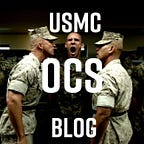After OCS: TBS, MOS School and The Fleet
Thanks to 2ndLt Gleason for sharing her advice and personal story. After OCS, there is still a lot to learn. TBS is the first real step in your Marine Corps Officer career.
After OCS
TBS was incredibly different from OCS. I feel that the physical standards at OCS don’t really prepare you for the physical expectation at TBS.
Hiking was much different; heavier, faster.
There are no female platoons and male platoons like there are at OCS. I’m 5’3” and maybe 120lbs, and the expectation is to keep up with the platoon or company. Field exercises and land navigation were longer and the terrain was much more difficult. However, I think the unexpected struggles are part of the training.
It sounds cliché, but you really do learn to expect the unexpected and get comfortable being uncomfortable.
In order to prepare for TBS, my biggest advice is to hike as much as you can.Put weight on your back and walk fast. “Evaluated” hikes at TBS are at a monitored pace and weight, but movements to ranges and field exercises are not. They are meant to be challenging. Running and jogging with a weighted pack will also prepare you for the 5-mile Endurance Course. To prepare academically, start reading; immerse yourself in Marine Corps history, publications, and books on leadership styles and techniques. If you’re not already comfortable with the 5 Paragraph Operations Order, learn it. Memorize it. You’ll spend hours and days writing them, reading them, and soon enough performing them. Mentally preparing may be the most difficult part, and that’s where I struggled the most. There were plenty of instances that depended on mental courage and fortitude. I honestly didn’t always succeed and push through those moments; whether it was a hike I thought was beyond my pace or a long, sleepless night followed by tactical missions throughout the day; but there’s no choice in the matter.
The mental endurance, patience, and resilience I gained at TBS is the most prominent aspect I took with me.
MOS Selection
Believe it or not, I actually wanted to be an Adjutant. I graduated college with a degree in Business Management and truly enjoyed my major. At TBS, the reputation of Combat Service Support MOSs is generally negative. Many people compete for the Combat MOSs, but the Marine Corps has more to offer. Beyond general admin (pay, promotions, awards, etc.), Adjutants play the role of Administrative, Legal, and often Financial Advisors to their Commander. Unlike most 2ndLts who start out as Platoon Commanders, Adjutants enter the fleet as primary staff officers.
The unique relationship Adjutants have with Battalion or Regimental Commanders, Executive Officers, and Sergeants Major is one that forces you to learn and grow quickly as a leader and subject matter expert.
Adjutant School
I believe Adj School has the shortest period of instruction of any MOS school. There is a lot to learn in about 7 weeks of classroom instruction. Being an Adjutant, you rely less on knowing the information, and instead knowing where to find the information. You’ll get familiar with many Marine Corps Orders and Publications. One of the most important lessons I learned in Adj School and my first few weeks in the fleet was to trust and verify my Marines do their jobs. A successful S-1 (Admin) Shop is a team effort. The areas of responsibility for an Adjutant are countless, but you’re not expected to do it all yourself. Empowering your Marines with responsibilities is the best way to train, educate, and motivate them as well.
Candidates and 2ndLts, what questions do you have for after OCS?
